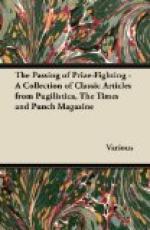WALES AND SIR A. GRIFFITH-BOSCAWEN.]
* * * * *
STUTTFIELD AND THE REDS.
Stuttfield was nothing of a NERO. He would never have fiddled while Rome burned. He would have been more likely to imagine that Rome was burning when there was really nothing more going on than a bonfire. He is one more example of the pernicious influence of sensational literature upon a nervous temperament.
It all began through Stuttfield finding a copy of The Daily Blast in a railway carriage last June. This journal is printed on white paper, but the tendency of its contents is ruddy—that is to say, it has “Red” leanings. It was a revelation to Stuttfield.
“Are people allowed to say such things?” he asked me in horror.
“My dear fellow, no one takes it seriously,” I said. “Don’t you worry.”
But Stuttfield did worry. The Daily Blast had the same effect upon him as a snake has upon a rabbit; it terrified him, yet he could not run away from it. In fact he became a regular subscriber and continued so despite some rumours that it was supported financially by the Rougetanians—rumours which required, and received, a great deal of explanation.
Then, through the offices of his man-servant, he obtained a copy of The Volcano.
The Volcano appears to be in advance of The Daily Blast in its ideals, and immensely so in their expression. But here again I assured Stuttfield that no one took them seriously. “I don’t suppose they take themselves seriously,” I assured him. “They want to sell The Volcano, that’s all.”
“Yes,” said Stuttfield, “but they do sell it, and people read it.”
“I expect the circulation’s about two thousand a week,” I said consolingly. But Stuttfield, as I could see, was not consoled.
I met him at intervals after that, and on each occasion he seemed to be more obsessed with the notion that the “Reds” would overwhelm us all shortly.
“Russia is Red,” he whispered; he always whispers now for fear of being overheard by a Red agent, though there was not very much risk of that in St. James’s Street. “And what about India and China?”
“Red, black and yellow—the Zingari colours,” I said ribaldly, and Stuttfield left me in disgust.
Then I heard from a friend that he had sold his cottage at Redhill. This was a bad sign, and I went to see him. I found him much worse.
“You’ve taken an overdose of The Volcano,” I said.
He seized my arm with trembling fingers.
“The Red Revolution is upon us,” he hissed.
I laughed. “Don’t you worry about the Red Revolution. You come out to lunch.”
He would hardly be persuaded. Clubs and restaurants would be attacked first, he thought. If we lunched together it had better be in an eating-house in Bermondsey. “I have a disguise,” he said, and disclosed a complete proletarian outfit.




